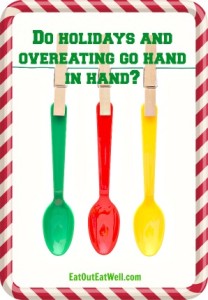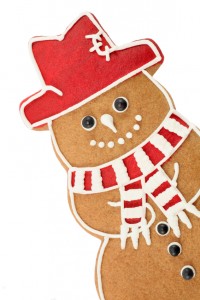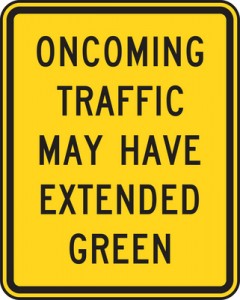 What’s your favorite holiday food? How much of it do you eat?
What’s your favorite holiday food? How much of it do you eat?
A lot of us actually plan to overeat during the holidays – although we may not admit it: think about it — do you know that you’re going to overeat? Do you think it wouldn’t be normal or celebratory if you didn’t overindulge and eat three desserts at Christmas or double helpings of stuffing and sweet potato casserole on Thanksgiving?
It’s all too easy to do that. Food is absolutely everywhere. It’s there for the taking — and most of the time, holiday food is free (and in your face) at parties, on receptionist’s desks, as sample tastes while you shop. How can you pass it up?
On top of it all, it’s sugary, fatty, and pretty. How can you not try it? Of course, sugary and fatty (salty, too) means you just crave more and more. Do you really need it? Do you even really want it? If you eat it, will you feel awful later on?
Are you eating because of tradition – because you’ve been eating the same food during the holiday season since you were a kid? Maybe you don’t even like the food anymore or it disagrees with you. So why are you eating it? Who’s forcing you to?
Do you think you won’t have a good time or you’ll be labeled Scrooge, Grinch, a party pooper, or offend your mother-in-law if you don’t eat everything in sight? Really?
You can still love the holidays and you can still love the food. In the grand scheme of things overeating on one day isn’t such a big deal. Overeating for multiple days that turn into weeks and then months can be become a bit and weighty deal.
The question is: do you really want to overeat? If you do, fine. Enjoy every morsel and then take a nap. Tomorrow is another day. Just know that you don’t have to. You make the decisions about what goes into your mouth. Make thoughtful choices and enjoy them along with everything else the holiday represents.
What To Do
- Have a plan. Think about how you want to handle yourself in the face of food, family, eggnog, and pecan pie. Nothing is engraved in stone but if you have an idea about what you want to do and how to do it you’ll be far less likely to nibble and nosh all day and night. You’re the one in charge of what goes into your mouth.
- Visualize the situation that you might find yourself in. What do you want the outcome to be? Rehearse, in your mind, how you’ll respond or behave to successfully navigate the eating challenges. Sports coaches use this technique to prepare their athletes to anticipate what might happen and to practice how to respond. Sports performance improves with visualization exercises—so can eating behavior.
- Make sure your plan is workable and realistic for what you’re aiming to achieve over the season. The plan doesn’t have to be complex – just decide what you want to do and what steps you need to get there.
- Write it down –even if it’s on a napkin. It will both reinforce your intentions and act as a measure of accountability.
- Consider what your surroundings will be. Will your plan work for you – it may sound great, but is it doable for the situations you might find yourself in? Will your host insist you try her special dessert and refuse to take no for an answer? Will you be eating in a restaurant known for its homemade breads or phenomenal wine list? Are your dining companions picky eaters, foodies, or fast food junkies? What will you do in these situations?
- Armed with your rehearsed plan, go out, use it, and stick to it as best you can. You assume control, not the circumstances and not the food. You are in charge of what food and how much of it will go into your mouth.


